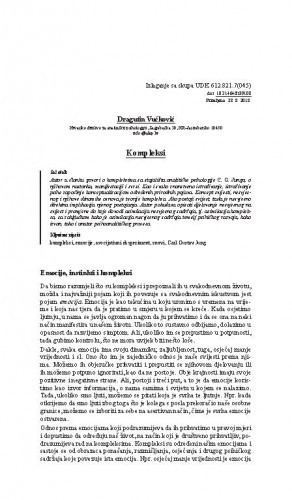Autor u članku govori o kompleksima sa stajališta analitičke psihologije C. G. Junga, o njihovom nastanku, manifestaciji i svrsi. Kao i svako znanstveno istraživanje, istraživanje psihe započinje konceptualizacijom određenih prirodnih pojava. Koncept svijesti, nesvjesnog i njihove dinamike osnova je teorije kompleksa. Ako postoji svijest, tada je nesvjesno direktna implikacija njenog postojanja. Autor pokušava opisati djelovanje nesvjesnog na svijest i promjene do koje dovodi asimilacija nesvjesnog sadržaja, tj. asimilacija kompleksa, sa zaključkom kako je asimilacija nesvjesnog sadržaja temelj psihičkog razvoja, kako izvan, tako i unutar psihoanalitičkog procesa.; In this paper, author discusses complexes from the standpoint of Carl Gustav Jung's analytical psychology, regarding their origin, manifestation and purpose. Like any scientific research, the research on psyche begins with the conceptualisation of certain natural phenomena. Concept of consciousness, unconsciousness and their dynamics is the basis of the theory of complexes. If there is a consciousness, then the unconsciousness is a direct implication for its existence. The author attempts to describe the work of unconscious on conscious and the changes that assimilation of unconscious content brings, that is, the assimilation of complexes. It is concluded that the assimilation of unconscious content is the base of psychic development, both outside and inside psychoanalytic processes.
Sažetak

 Filozofska istraživanja : 39,1(2019) / glavni i odgovorni urednik Ante Čović.
Filozofska istraživanja : 39,1(2019) / glavni i odgovorni urednik Ante Čović.